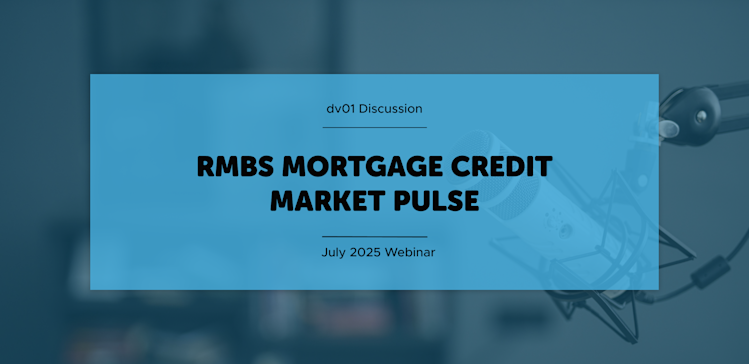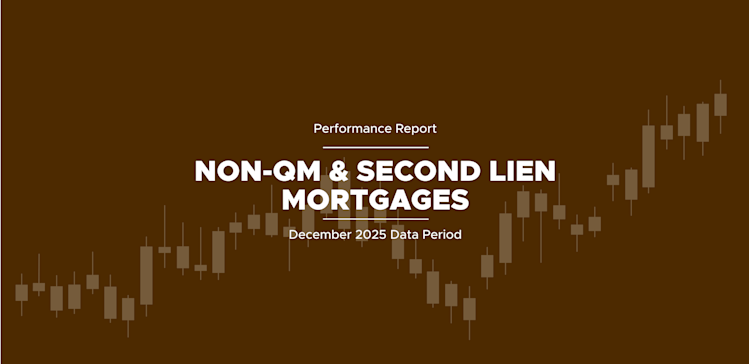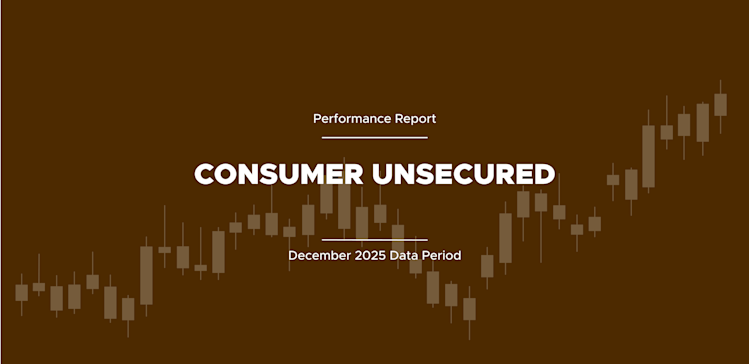Research
dv01 Discussion: RMBS Mortgage Market Pulse, July 2025 Webinar
30 July 2025
RMBS Webinar Recap: Mortgage Market Trends & the Rise of Private Credit
dv01 recently hosted a timely panel discussion focused on the state of the mortgage credit market. The conversation spanned market performance trends, delinquency dynamics, investor sentiment, and the growing role of private capital in reshaping mortgage finance. Below is a summary of the key insights shared.
Market Performance: Still Strong Despite Headline Noise
The mortgage market in 2025 continues to show resilience. Overall delinquency rates remain near the record lows set in 2023 and 2024. Performance across agency and GSE portfolios remains strong, while FHA/VA and non-QM segments are showing some early signs of stress.
However, losses remain minimal. Even as delinquencies rise in pockets of the market, there’s been little evidence of actual credit deterioration. Losses across non-QM securitizations are still measured in single-digit basis points—well within expectations. The market appears to be undergoing a normalization from historically low loss levels, not a breakdown in credit fundamentals.
Non-QM: A Return to Expected Credit Behavior
Panelists observed that the recent performance in non-QM loans reflects a return to more typical credit behavior. While these loans often feature higher FICO scores and lower LTVs, many borrowers are self-employed or property investors, making their cash flows more susceptible to macroeconomic shifts.
Traditional underwriting principles still apply. FICO remains a reliable performance indicator, and investor-purpose cash-outs are underperforming relative to other segments. More recent vintages, however, are showing signs of stabilization as borrowers adapt to a higher-for-longer rate environment.
Investor Sentiment: Stable and Constructive
Investor demand has remained solid, even amid periods of rate volatility. In April, markets experienced a brief disruption in trading activity and securitization, but spreads rebounded quickly and the overall recovery was orderly.
While the window to take advantage of wider spreads was short, the underlying tone remains constructive. There is strong participation in the space—particularly from institutional capital sources—which continues to provide a steady foundation for non-QM credit.
The Rise of Private Capital: Structural Implications
Private credit is becoming an increasingly important funding source in mortgage finance. Panelists noted that the share of non-QM loans financed through securitization has declined—from as high as 80–90% to somewhere in the 60s—driven by increased whole loan purchases.
Life insurers and other institutional investors are fueling this trend, attracted by the capital efficiency and collateral benefits of holding residential mortgage loans directly. Rather than fully replacing securitization, private credit is emerging as a strong complement—expanding the set of reliable funding channels for originators.
Second Liens (Closed-End Seconds and HELOC): A Growing Corner of the Market
Panelists highlighted the increased demand for second lien and HELOC products, particularly among fintech and digital lenders. While most balances still sit on bank portfolios, institutional interest is rising.
To help bring standardization and visibility to this segment, dv01 and Fitch recently released co-branded benchmarks covering both Closed-End Seconds and HELOCs. Panelists agreed that with better data and efficient origination models, second liens have the potential to become a more mainstream, investable asset class.
Conclusion
The key message from the discussion: the mortgage market remains fundamentally healthy. While some credit metrics are normalizing, performance is strong, investor sentiment is positive, and funding channels are diversifying. Whether through traditional securitizations or rising private credit flows, the ecosystem is adapting—and evolving—with resilience.
How dv01 Supports Private Credit and Structured Finance
As the mortgage and private credit markets evolve, dv01 offers the infrastructure to support both growth and transparency across the capital stack. Whether you're structuring new transactions, managing warehouse facilities, or investing in private credit, dv01 provides the tools and data to help you move with confidence. Our platform powers end-to-end workflows for originators, lenders, and investors alike. Key capabilities include:
Deal Transaction Reporting: Private Credit ABF, Securitizations, and Forward Flows
Serve as embedded infrastructure for data analysis, management, and reporting—whether you're issuing a securitization, managing a private credit facility, or executing a forward flow sale. dv01 handles loan ingestion, waterfall modeling, investor reporting, and data delivery, acting as the Loan Data Agent across public and private transactions.
Deal Structuring Tools
Analyze cashflows, model tranches, and structure new deals in an intuitive interface designed for rapid scenario testing and capital stack optimization.
Benchmark Datasets
Access rich datasets across mortgage asset classes—Non-QM, Prime Jumbo, and Second Lien HELOCs and Closed-End Seconds—to evaluate performance, spot trends, and benchmark against the broader market.


